New World members explore chamber rarities from Bach to Bridge
This season’s New World Symphony’s chamber music concerts have been notable for exceptional performances of rarely heard 20th-century works for strings. On Sunday at the New World Center, string players of the orchestral academy assayed a score by British composer and violist Frank Bridge.
Bridge (1879-1941) is best known today as the teacher of Benjamin Britten but he created a considerable number of orchestral, chamber, choral and organ works. Stylistically, Bridge evolved from the English pastoral lyricism of Vaughan Williams to more modernist currents of Stravinsky and Bartok and even post-tonal Schoenberg. Bridge’s String Sextet in E-flat, written between 1906 and 1912, is firmly conceived in his early melodic vein with a decisive nationalist accent.
The beauty and flowing themes of the opening Allegro moderato seem totally divorced from contemporaneous events that would culminate in World War I nor are the avant-garde music sweeping Europe at that time. The gravitas of the Allegro con moto is interrupted by a whirling scherzo section. Restless figurations and a touch of British fol kdance precede a reprise of earlier themes in cyclical fashion and a hard-driving coda to conclude the final Allegro ben moderato. The entire score is exquisitely crafted, and its 26-minute length flew by.
The lovely sonority of first violinist Connor Chaikowsky was first among equals with the six players demonstrating unanimity and melding of timbres. Bridge’s scoring for two cellos emphasizes the darker sound of the lower strings and Jessica Hong’s sumptuous cello solos enhanced the outer movements. In the fiery central episode of the second movement, the group’s playing was razor-sharp, energetic and fully integrated. Violinist Marissa Weston, violists Peter Ayuso and Daniel Guevara and cellist Samantha Powell all exhibited superior chamber music skills in a winning reading of an unjustly neglected composition.
The Bridge sextet was preceded by the concert’s other high point, a performance of Bach’s Concerto in C minor for two keyboards and strings with guest artist Elizabeth Joy Roe and New World keyboardist Shih-Man Weng in the solo spotlight.
The work is Bach’s 1736 transcription, originally for two harpsichords, of his Concerto in D minor for two violins. This was one of the many pieces the master wrote or arranged for Sunday concerts at Zimmermann’s Coffee House in Leipzig. In this version, the two solo parts emerge with greater clarity and specificity.
Roe, a member of the duo-piano team of Anderson and Roe, brought rhythmically incisive teamwork to the first movement. Weng (playing the primo part) and Roe were adroitly coordinated and balanced. There was a flowing sense of pulse in the eloquent Andante, with the pianists’ touch light and tonal blend lovely. The concluding Allegro assai was wonderfully invigorating and brisk in the best modern Baroque manner. The eleven string players were full collaborators, totally in sync with the soloists.
The program’s first half opened with Music for Brass (Sacred and Profane) by George Walker. Traversing atonality, jazz, a Lutheran hymn and the Tommy Dorsey hit “Once in a While,” the score is expertly crafted but decidedly bland. The five brass players still managed to create a joyful cacophony.
Johann Nepomuk Hummel was a friend and competitor of Beethoven and a pupil of Mozart. His Septet No. 2 (“Military”) is a piano concerto in all but name with a flashy trumpet part. While definitely a period piece, there is some lovely melodic invention in the four-movement score. The interplay of martial and more aristocratic themes in the first movement is followed by an elegant Andante that presages Chopin in its pianistic filigree. More overt keyboard bravura in the final two movements bring the entertaining but—at 35 minutes—overlong opus to an end.
Roe’s outstanding solo playing made the work worth reviving, and her dexterity, deft articulation and stylish classicism were consistently stellar. She drew a fine sound from the house Yamaha which can be problematic. Alan Tolbert’s trumpet blazed impressively in the fanfare-like passages. Tyler Bourque’s mellow clarinet and Cierra Hall’s pure and sweet-toned flute resounded in the work’s quieter, more evocative motifs. Violinist Archer Brown, cellist Christopher Chan and bassist Bryan Bailey completed the excellent ensemble.
The New World Symphony’s chamber series continues 2 p.m. February 18 at New World Center. The program includes Debussy’s Sonata for Flute, Viola and Harp, Michael Linville’s A Dove Peered In (After Hildegard von Bingen), Beethoven’s String Quintet in C Major, and tenor Karim Sulayman as soloist in Benjamin Britten’s Nocturne. nws.edu
Posted in Performances
Leave a Comment
Mon Jan 29, 2024
at 1:09 pm
No Comments
